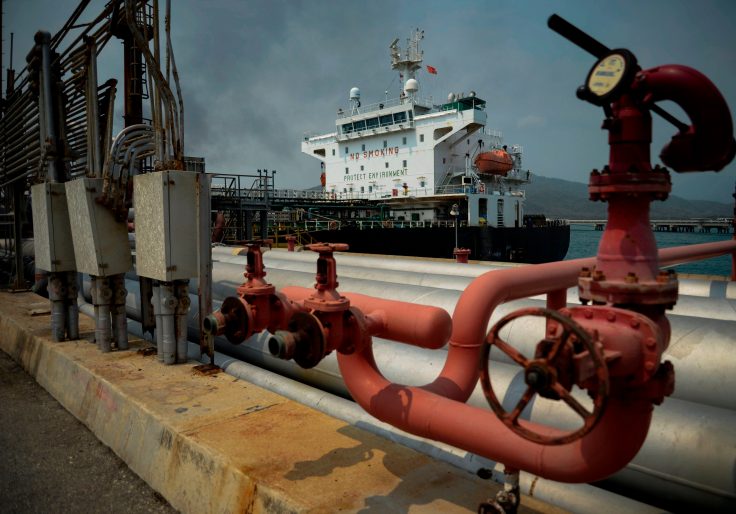Iran’s illicit oil exports have hit a five-year high under the Biden administration, which has refrained from seizing Tehran’s outlaw tankers even though authorities have had at least half-a-dozen credible leads, according to intelligence information collected by Congress and provided to the Washington Free Beacon.
Iranian oil exports—a principal source of income for Tehran’s cash-strapped regime—increased by 35 percent from 2021 to 2022, indicating that the Biden administration is not enforcing sanctions meant to prevent these sales. Record oil revenues have enabled Iran to boost pay for its regional terror proxies and cause havoc in the Strait of Hormuz, a critical shipping lane where Tehran routinely harasses U.S. military vessels and seizes commercial shipping boats.
Iran has tried to abduct five ships since April, and has "harassed, attacked, or seized nearly 20 internationally flagged merchant vessels" since 2021, according to data from Sen. Joni Ernst’s (R., Iowa) office. The situation has become so dire that the Biden administration moved additional war planes into the region earlier this month to help deter attacks.
Amid this uptick in Iranian aggression, the Biden administration has failed to enforce sanctions on Tehran’s oil trade, which benefits China, Syria, and Venezuela. Iranian oil sales stood at $44 billion as of August 2022—a 77 percent increase from 2020—with analysts attributing the rise to President Joe Biden’s "terminally lax sanctions enforcement." Although the Biden administration has been armed with the intelligence information to seize at least six illicit Iranian oil ships in recent months, it has only detained one ship in the past year, likely to appease Tehran amid diplomatic talks to restart the 2015 nuclear deal.
"By allowing Iran to increase their illicit oil profits, the Biden administration is greenlighting additional funding for their terrorist activities, forcing the U.S. to put more assets in the region, and putting more resources at risk," Ernst told the Free Beacon in a statement. "This strategy of appeasement must end—lives are on the line."
A State Department spokesman denied allegations the administration is not enforcing oil sanctions on Iran, saying that strict measures "remain in place and will continue unless and until Iran’s nuclear program returns to compliance with prior commitments."
"Any notion that we are not enforcing our sanctions is false," the spokesman said, speaking on background about the matter. "The United States has taken numerous actions against sanctions evaders around the world under the Biden administration."
Iran is exporting nearly 1.5 million barrels per day in total, with nearly 1.4 million of those going to Beijing. From June to July, oil exports to China rose by about 300,000 barrels per day, according to statistics published Tuesday by United Against a Nuclear Iran, a watchdog group that tracks Tehran's illicit oil tankers.
"It is China's unwavering demand for Iranian crude that remains the key constant and critical lifeline for Iran’s oil exports," the group said.
The impact of the administration’s lax sanctions enforcement can be felt across the Middle East, where Iranian-backed terror groups are increasing recruitment and operations.
Syria-based militia groups funded by Iran announced a 13 percent pay raise earlier this month, according to the Institute for the Study of War, "likely enabling Iran to maintain a competitive advantage in recruitment amid increasing troop deployments to the province."
Ernst’s office also learned that U.S. Central Command, which leads operations in the region, "is struggling to maintain deterrence" as Iran ramps up terrorism in international waters.
CENTCOM commander Gen. Michael Kurilla said in March that his forces are increasingly strained as the Biden administration pulls forces from the region.
"The U.S. Central Command theater holds almost no assigned forces, and with the declining emphasis on defeating violent extremist organizations and the National Defense Strategy shift in primary focus to U.S. strategic competitors, our forces decreased 15 percent over the course of 2022 alone," Kurilla said in a force posture statement earlier this year. "CENTCOM force posture saw a reduction of 85 percent from its 2008 peak."
The lack of forces, combined with the Biden administration’s efforts to block authorities from seizing illegal Iranian oil ships, has emboldened Iran at a time when U.S. diplomats are eager to ink a nuclear deal with the hardline regime.
Senators from both parties have signaled displeasure with the situation in recent months, including Senate Foreign Relations chair Bob Menendez (D., N.J.), who is pushing legislation to expand sanctions on Iran’s drone and missile program.
Ernst and several Democratic colleagues are also pushing for greater enforcement of oil sanctions and leaning on the Biden administration to use its power to seize Tehran’s tankers.
Ernst is also the author of legislation that would authorize unprecedented military collaboration between the United States, Israel, and its Arab neighbors under the architecture of the Abraham Accords, the Free Beacon first reported earlier this month. The military coalition would work to address Iran’s maritime threats by linking the newfound allies’ missile defense systems.
A separate measure, backed by both Ernst and Menendez, would authorize the U.S. defense establishment to begin cybersecurity and information sharing activities with nations party to the Abraham Accords, which would also help deter Iranian aggression.
